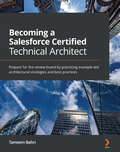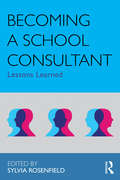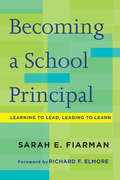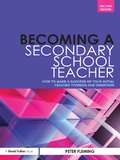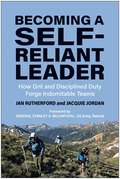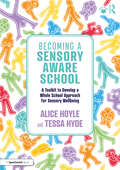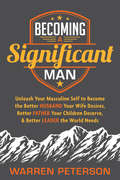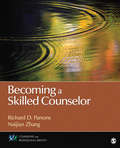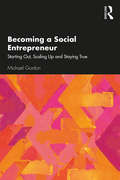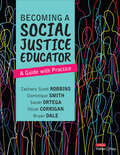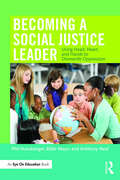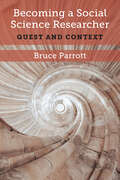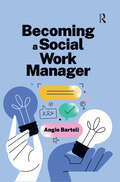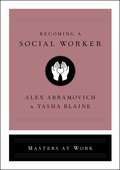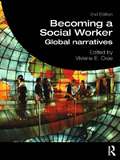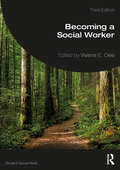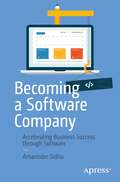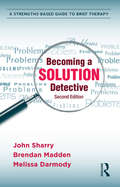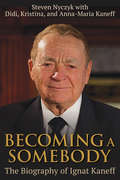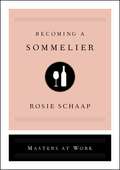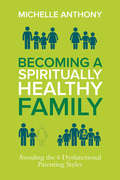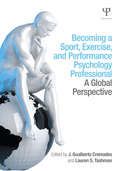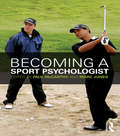- Table View
- List View
Becoming a Salesforce Certified Technical Architect: Prepare for the review board by practicing example-led architectural strategies and best practices
by Tameem BahriDesign and build high-performance, secure, and scalable Salesforce solutions to meet business demands and gain practical experience using real-world scenarios by creating engaging end-to-end solution presentationsKey FeaturesLearn common integration, data migration, and security patterns for designing scalable and reliable solutions on the Salesforce Lightning platformBuild an end-to-end delivery framework pipeline for delivering successful projects within specified timelinesGain access to an exclusive book club of skilled Salesforce professionals, to discuss ideas, best practices, and share experiences of designing modern solutions using SalesforceBook DescriptionSalesforce Certified Technical Architect (CTA) is the ultimate certification to validate your knowledge and skills when it comes to designing and building high-performance technical solutions on the Salesforce platform. The CTA certificate is granted after successfully passing the CTA review board exam, which tests your platform expertise and soft skills for communicating your solutions and vision. You'll start with the core concepts that every architect should master, including data lifecycle, integration, and security, and build your aptitude for creating high-level technical solutions. Using real-world examples, you'll explore essential topics such as selecting systems or components for your solutions, designing scalable and secure Salesforce architecture, and planning the development lifecycle and deployments. Finally, you'll work on two full mock scenarios that simulate the review board exam, helping you learn how to identify requirements, create a draft solution, and combine all the elements together to create an engaging story to present in front of the board or to a client in real life. By the end of this Salesforce book, you'll have gained the knowledge and skills required to pass the review board exam and implement architectural best practices and strategies in your day-to-day work.What you will learnExplore data lifecycle management and apply it effectively in the Salesforce ecosystemDesign appropriate enterprise integration interfaces to build your connected solutionUnderstand the essential concepts of identity and access managementDevelop scalable Salesforce data and system architectureDesign the project environment and release strategy for your solutionArticulate the benefits, limitations, and design considerations relating to your solutionDiscover tips, tricks, and strategies to prepare for the Salesforce CTA review board examWho this book is forThis book is for Salesforce architects who want to become certified technical architects by learning how to design secure and scalable technical solutions for their organizations. A solid understanding of the Salesforce platform is required, ideally combined with 3 to 5 years of practical experience as an application architect, system architect, enterprise architect, or solution architect.
Becoming a School Consultant: Lessons Learned (Consultation, Supervision, and Professional Learning in School Psychology Series)
by Sylvia RosenfieldMost consultation courses in school psychology focus heavily on theoretical models of consultation and associated intervention procedures. Little time is devoted to developing communication and process skills. Yet these process skills are key to properly identifying student problems and selecting appropriate interventions. Without skillfully conducted consultations, implementation and evaluation of an intervention can be minimal. This book is designed to help students develop the process skills needed to become effective school consultants in consultee-centered consultation, with special emphasis on the instructional consultation model. The authors address specific skills and issues faced by novice consultants and documents how they worked through particular issues that are likely to occur in school consultation practice.
Becoming a School Principal: Learning to Lead, Leading to Learn
by Sarah E. FiarmanThe principal&’s role is increasingly understood as a critical lever for school improvement. Yet the job can be a solitary one, offering few opportunities to reflect with colleagues. What does it take to manage the work of continuous improvement—to push staff members constantly to operate outside their comfort zones? What dilemmas and challenges must principals confront? How can school leaders learn from their mistakes and move forward? In Becoming a School Principal, Sarah E. Fiarman describes her first few years as a school principal committed to enacting a powerful vision of leading and learning. Drawing thoughtfully on the literature of school reform and change leadership, Fiarman discusses a wide range of topics, including empowering teachers, building trust, addressing racial and economic inequities, and supporting a culture of continuous learning, as well as thornier issues such as learning to use authority skillfully, dealing with resistance, and managing supervision and evaluation. The book addresses common challenges and highlights missteps as well as successes. A contributing author to several leading books on school reform and instructional improvement, Fiarman engages readers in a lively, frank, and revealing conversation about building the vision and capacity to provide effective instruction for all students and the intensely personal process of learning to lead.
Becoming a Secondary School Teacher: How to Make a Success of your Initial Teacher Training and Induction
by Peter FlemingAimed at supporting those undertaking initial teacher training and the statutory Induction period that follows, Becoming a Secondary School Teacher explores the skills, roles and knowledge needed to become a successful teacher in today’s secondary schools. Providing detailed guidance on key areas of professional practice, the book helps the reader to link key theories and principles to the reality they will find in the classroom. This edition has been fully updated to reflect the latest legislation and Teachers’ Standards as well as changes in practice and expectations regarding learning, assessment and inclusion. Highly accessible and full of practical advice it includes: • guidance on key skills for classroom success including lesson planning, classroom management and assessment; • practical tips on handling areas of real concern such as discipline, workload, job interviews and relationships with colleagues; • advice on teaching beyond your specialist subject and teaching in challenging circumstances; • reference throughout to the Core Standards that have to be met during training, what these mean in practice and how they might be evidenced. With a strong reflective focus through case studies, action points and reflection points, this book is core reading for all students wanting to get the most out of their initial teacher training programme.
Becoming a Self-Reliant Leader: How Grit and Disciplined Duty Forge Indomitable Teams
by Jan Rutherford Jacquie JordanDiscover the ultimate prescriptive handbook on what it takes to design and lead energized and effective teams in an increasingly complex and uncertain global landscape. Becoming a Self-Reliant Leader was crafted from author Jan Rutherford&’s Crucible® Expedition wilderness experiences. This insightful, practical guide explores each step of the Crucible journey and how its lessons can be applied to today&’s leadership challenges. The lessons are based around the three pillars of Self-Reliant Leadership®—leading yourself, leading others, and leading an organization—and include how to: Develop courage, curiosity, and grit to confront challenges and lead your team effectively Select the right people for your team—people who are selfless, adventurous, and heroic Create the right direction, pace, and tone to sustain a culture of disciplined duty Design and maintain a positive and energized work environment Build mutual, genuine trust among team members and fellow leaders where true commitment versus mere compliance prevails This compilation of lessons and stories from past expeditions offers business leaders more than just an exciting read—it&’s a proven recipe to creating and sustaining high-performing teams.
Becoming a Sensory Aware School: A Toolkit to Develop a Whole School Approach for Sensory Wellbeing
by Alice Hoyle Tessa HydeSensory needs are often misunderstood and, as a result, neglected across many schools. Yet sensory needs are universal foundational building blocks at the base of both human and learning needs. This practical book covers everything schools need to know and consider about the sensory needs of all students and staff within the school environment. By focusing on all sensory needs in a holistic way, this leads to a deeper understanding of one another and is a truly inclusive approach to benefit all.Sensory Aware Schools have the potential for happier and more productive learning environments, with reduced potential for disruption as well as improvements in how school communities work and learn together. Chapters look at the sensory aware student and teacher and the sensory aware classroom and school, setting out the roadmap for working from sensory awareness to sensory inclusion and towards sensory wellbeing.The book:• Sets out the core and quality standards for Sensory Aware Schools• Provides a clear introduction to sensory systems and sensory awareness, discussing a variety of different models and approaches• Contains audit tools to help the reader to reflect on sensory needs, as well as a wealth of best practice tips, reflective questions and case studies• Develops staff skills in recognising and responding to sensory needs • Offers easy-to-implement, practical strategies for effective, short-term adjustments as well as long-term improvements to the sensory school environment• Includes an extensive sensory curriculum for students.This accessible book equips the reader with a multitude of strategies and resources and illustrates how adopting a whole school approach to sensory wellbeing will benefit everyone. It is essential reading for school leaders, Special Educational Needs and Disabilities Co-ordinators (SENDCOs) and primary and secondary teachers in mainstream or specialist provision, who are keen to develop an ethos of supporting sensory needs.
Becoming a Significant Man: Unleash Your Masculine Self to Become the Better Husband Your Wife Desires, Better Father Your Children Deserve, & Better Leader the World Needs
by Warren Peterson<p>Most men have given up on their dreams. Is that man you? Something is so clearly wrong, and the entire world knows it. The reality is that men have been sold a lie; they have been told that if they chase success in the world then everything will be ok. Instead, they end up with the cars, the house, the toys, and are still left in pain asking, “Is this all there is?” The cost of the lie is enormous. Becoming a Significant Man provides easy to digest ways on how to become the man you want to be and stay there. If you are tired of sleepwalking your way through life, then Becoming a Significant Man is for you. <p> <p>Warren Peterson, founder of Significant Man, is eager for all men who have fallen behind in the game of life to benefit from his unique and powerful message. Haven’t you had enough? Enough of the struggle? Enough of feeling lost, without direction, and without hope? No more lies. No more pretending. Your time is now. You have the power and permission to stand up and scream the truth about who you are— the significant man you were created to be. Let’s get started!<p>
Becoming a Skilled Counselor (Counseling and Professional Identity)
by Dr Naijian Zhang Richard D. ParsonsThe core text for counselor skill development, Becoming a Skilled Counselor prepares students with the knowledge and skills necessary to be effective helpers. Authors Richard D. Parsons and Naijian Zhang provide an understanding of the essentials of the counseling relationship, the dynamic and intentional nature of the helping process, and the theories and research guiding the selection and application of interventions.
Becoming a Social Entrepreneur: Starting Out, Scaling Up and Staying True
by Michael GordonWhat’s it like to be a social entrepreneur – not a textbook social entrepreneur but one on the ground? This book offers an explanation. Michael Gordon, leading Social Entrepreneurship expert from the University of Michigan, spoke with more than one hundred social entrepreneurs – from six continents, young and old, just starting out to several decades in, addressing seemingly every societal problem of the day. This book uses their words and experiences to provide a kaleidoscopic description of what it means to become a social entrepreneur. It ranges from the personal and emotional challenges they often face to the grand impact many hope to produce. It touches on the sublime but focuses on the everyday, highlighting the mistakes that have been made, the lessons learned and, especially, what advice they would give to those wanting to start a social venture. This book presents the truth, not the varnish, and is ideal for use in the classroom with students studying social entrepreneurship, and for all new and experienced social entrepreneurs seeking real-life examples of how to overcome challenges. For anyone else, it offers a penetrating portrait of the lives of those committed to changing the world.
Becoming a Social Justice Educator: A Guide With Practice
by Zachary Scott Robbins Dominique Smith Sarah Ortega Oscar Corrigan Bryan Dale DaleThe curiosity-stirring, can-do handbook for building inclusive cultures With one click we can make our camera lens switch from portrait to landscape, so why can’t we find a simple way to broaden our perspectives on equity? Because human beings are wildly complex, for one thing. But this potent guide simplifies, providing concrete techniques for becoming expansive educators capable of engaging every student. Chapter assets include: Compelling research to support why it’s urgent we embrace foundational fairness—and why even subtle words can have massive effects on students’ sense of potential Questions and prompts that help you build inclusive thinking into your expectations of students, your feedback, grading, and approaches to discipline Activities, discussion frames, and debate structures that support students’ exploration of complex topics Ideas for engaging staff, leadership, family, and the community in ways that reveal strength Social justice work is not "other;" it’s not extra. It’s student agency work. It’s what keeps so many of us educators up at night, worried about why some of our learners aren’t engaged. With this book, they will be engaged, because they will know you believe in their abilities, and now know how to show that every day.
Becoming a Social Justice Educator: A Guide With Practice
by Zachary Scott Robbins Dominique Smith Sarah Ortega Oscar Corrigan Bryan Dale DaleThe curiosity-stirring, can-do handbook for building inclusive cultures With one click we can make our camera lens switch from portrait to landscape, so why can’t we find a simple way to broaden our perspectives on equity? Because human beings are wildly complex, for one thing. But this potent guide simplifies, providing concrete techniques for becoming expansive educators capable of engaging every student. Chapter assets include: Compelling research to support why it’s urgent we embrace foundational fairness—and why even subtle words can have massive effects on students’ sense of potential Questions and prompts that help you build inclusive thinking into your expectations of students, your feedback, grading, and approaches to discipline Activities, discussion frames, and debate structures that support students’ exploration of complex topics Ideas for engaging staff, leadership, family, and the community in ways that reveal strength Social justice work is not "other;" it’s not extra. It’s student agency work. It’s what keeps so many of us educators up at night, worried about why some of our learners aren’t engaged. With this book, they will be engaged, because they will know you believe in their abilities, and now know how to show that every day.
Becoming a Social Justice Leader: Using Head, Heart, and Hands to Dismantle Oppression
by Phil Hunsberger Billie Mayo Anthony NealThis important book helps school leaders let go of a "comfortable" mindset and enter a world of courageous conversations that examine and challenge the impact of racism and other forms of oppression on disciplinary patterns, instructional practices, and school policies. Authors Hunsberger, Mayo, and Neal prepare you to address these difficult issues though authentic, critical discourse. The book includes classroom activities and facilitation tips to help prompt systematic changes in schools through improving instruction, supporting inclusiveness, and strengthening student engagement. After reading Becoming a Social Justice Leader you’ll be able to: Design conversations that support participant engagement and create a safe environment for discussion. Explore personal dispositions, attitudes, and stances that contribute to systemic oppression. Understand how oppression is established and sustained in order to enact change. Create alliances within school settings to foster dialogue and combat oppression. Additional worksheets that help educators examine and expand their work as social justice leaders are also available for download (http://www.routledge.com/products/9781138957749).
Becoming a Social Science Researcher: Quest and Context
by Bruce ParrottBecoming a Social Science Researcher is designed to help aspiring social scientists, including credentialed scholars, understand the formidable complexities of the research process. Instead of explaining specific research techniques, it concentrates on the philosophical, sociological, and psychological dimensions of social research. These dimensions have received little coverage in guides written for social science researchers, but they are arguably even more important than particular analytical techniques. Truly sophisticated social science scholarship requires that researchers understand the intellectual and social contexts in which they collect and interpret information. While social science training in US graduate schools has become more systematic over the past two decades, graduate training and published guidance still fall short in addressing this fundamental need.
Becoming a Social Work Manager
by Angie BartoliAn innovative guide for social workers who are about to take the next step in their career to become a social work manager, or who may have recently taken on that role. Practitioners will learn how they can prepare for this transition, how it really feels to be a manager, and how to develop their professional identity.Despite the interest in how social work roles are managed and led, the actual experience of the transition to social work manager can be overlooked. Many books written around this topic focus on the skills needed to be a manager, management and organisational concepts rather than how it feels to go through the process and how to cope as a new manager.This book draws on a relationship-based model, proposing that relationships play a significant part in the transition into management. It emphasises the importance of how managers support their teams and individuals while also caring for themselves.Based on research with newly promoted social work managers, this book features in-depth case studies which illustrate four significant points in the transitional journey: preparation for the role, multiple identities, managing people, and self-care. The concluding chapter offers a practical model that readers considering social work management can utilise within their own supervision or annual appraisal to support a smoother transition into management.
Becoming a Social Worker (Masters at Work)
by Alex Abramovich Tasha BlaineA revealing guide to a career as a social worker based on the real-life experiences of three distinguished social workers—required reading for anyone considering a path to this profession.Becoming a Social Worker takes you behind the scenes to find out what it&’s really like, and what it really takes, to become a social worker. Acclaimed authors Alex Abramovich and Tasha Blaine shadow three distinguished social work professionals to reveal how this compassionate field changes lives. Discover what it&’s like to tirelessly advocate for victims of domestic violence and sex trafficking, investigate accidental drug overdose deaths in New York City, and assist clients in a full-time private practice. Gain insight from these social workers paths as they offer wisdom and insight from their years of service. Social workers have a common mission to serve people in need—here is how this life-changing job is actually practiced at the highest levels.
Becoming a Social Worker: Global Narratives (Student Social Work)
by Viviene E. CreeThis is a book about social workers and social work. It tells the story of the journey into and through social work of people from around the world living and working in social work today. We hear what has brought them into social work and what has kept them in it since. Their lively accounts demonstrate that commitment and passion remain at the heart of social work today. This new edition of Becoming a Social Worker is made up of entirely new stories. It describes what it is like to be a social worker in a range of different practice settings in different countries. While many of the narratives are from practitioners and educators who either grew up in, or came as adults to, the UK, half of the narratives explores the experiences of social workers and educators working in different parts of the world in countries as diverse as Australia and New Zealand, India and Bangladesh, Ireland, Sweden and Eastern Europe, Nigeria, the USA and Canada. The book ends with a commentary, which argues that social work is truly a global profession. Some of the contributors will be recognised as those who have played a key part in shaping social work over the years and they provide valuable insights into how the profession has developed over time. Other contributors, less well known but no less interesting, give a vivid account of the challenges that social work education and practice face, and the shared values that underpin social work wherever it is located. Social work is a demanding and difficult job that goes largely unseen within society. We only ever hear about social work and social workers when something goes wrong and a vulnerable adult or child is hurt. Becoming a Social Worker sets out to change that – to make social work visible, so that those considering a career in the caring professions across the world can make an informed choice about whether social work is the career for them.
Becoming a Social Worker (Student Social Work)
by Viviene E. CreeThis fully revised new edition of Becoming a Social Worker is made up of entirely new stories. Providing a ‘glocal’ frame of reference, the book describes the personal and professional narratives of a diverse range of people working in social work in the UK, what brought them into the field and what has kept them in it ever since. The lively accounts reveal what it is like to be a social worker in a range of practice settings today and, at the same time, demonstrate that commitment and passion remain at the heart of social work. Some contributors will be recognised as people who have played a key part in shaping social work over the years; they provide insights into how the profession has developed over time. Other contributors, less well known but no less interesting, give a vivid account of the ongoing challenges that social work education and practice face, and the values that underpin social work. Social work is a demanding and difficult job that goes largely unseen within society. We only ever hear about social work and social workers when something goes wrong and a vulnerable adult or child is hurt. Becoming a Social Worker sets out to change that – to make social work visible, so that those considering a career in the caring professions across the world can make an informed choice about whether social work is the career for them. It is relevant for all induction courses at the beginning and prior to coming on social work programmes including all relevant HNC and HND courses as well as preparation for practice courses on all undergraduate and postgraduate social work programmes.
Becoming a Social Worker: A Guide for Students
by Dr Caroline HumphreyThis book explores the journey of becoming a social worker. It is based upon the experiences of social work students themselves and therefore provides a unique 'inside-out' perspective. By showing that personal, professional and political elements are interwoven in students' journeys, the author demonstrates that integrating these elements is vital to critical reflection and relationship-based social work. Content includes social work theory, therapeutic and risk-management interventions, emotional and ethical aspects of practice, political and cultural contexts of practice, and issues around supervision and assessment. The book also : " includes introductions, real-life case study exercises, points for reflection, diagrams and tables, further reading and resources " equips new students to reflect upon their own journeying and to learn more effectively from modules and placements " provides case study material on all aspects of placements such as meeting Key Roles and value requirements " covers career pathways for final year students, including guidance on dealing with job interviews and occupational stress This is important reading across a range of modules and will be particularly valuable for new students and students on placement.
Becoming a Software Company: Accelerating Business Success through Software
by Amarinder SidhuThere is a call to action reverberating in company boardrooms, earnings calls, technology conferences, and IT departments: every company should be a software company. The call makes intuitive sense. Software, when done right, creates infinite business leverage. It is not a coincidence that 7 out of 10 largest companies in the world are software companies. But how does a company become a software company? This book will help enterprises transform into a software company.The software-driven future that Marc Andreessen predicted in his now-famous 2011 essay is here but unevenly distributed. While enterprises, and teams within, grasp the software technologies, they lack the context to leverage them — much less understand the fundamental principles that drive the business value from software: What is the real essence of the software-based transformation? If every enterprise is implementing the same technologies, what is the source of differentiation? How do you manage the inherent complexity of software such that it doesn't destroy software's value? How do you build and nurture talent so that it is empowered to create the best solutions for your customers' problems? This book will answer all of that and more.The boundary between enterprise and consumer software is rapidly blurring. IEEE reports that 40% of the cost of a new car comes from software . Elsewhere, software is becoming synonymous with medical devices and therapeutics . FinTech and EdTech trends are primarily about personalization through software at an internet-scale. The struggling enterprises are up against it. They have no choice but to figure out how to ship consumer-grade software. It is an existential problem for them.This book compiles the timeless principles of building good software, yet often disregarded while building and deploying software products for enterprises.What You'll LearnLeverage people to build creative software solutionsManage development complexity so that we keep software focused on user problemsUnderstand software technology as a means of producing valueWho This Book Is ForEnterprise Executive Management, Enterprise IT Management Professionals, Software Practitioners within Enterprise
Becoming a Solution Detective: A Strengths-Based Guide to Brief Therapy
by John Sharry Brendan Madden Melissa DarmodyIf you are interested in making your practice solution-focused quickly and effectively, look no further than this text. The authors, co-founders of the Brief Therapy Group, demystify the process of psychotherapy, making the concept of solution-based therapy accessible and relevant for newcomers to the field and for professionals seeking to apply SFBT principles in their own practices. The book’s hands-on approach allows practitioners to adopt the authors' simple, self-teaching style and apply it to their work with clients. Practical information is included on: the differences between the solution-based approach and traditional therapy establishing a successful therapeutic alliance with clients determining detailed, meaningful goals for the client mapping the client’s journey to a solution possible “dead ends” in applying this type of therapy and much more! As an academic textbook, it is ideal for individual study in a variety of courses, including social work, counseling, nursing, psychology, education, and any other helping professions.
Becoming a Somebody: The Biography of Ignat Kaneff
by Steven NyczykThe fascinating life story of Ignat Kaneff, one of Canada’s leading builders. When Ignat Kaneff arrived in Canada in 1951, he had five dollars to his name, spoke no English, and had very little education. Yet, this was the beginning of one of Canada’s great immigrant success stories. Having left his native Bulgaria at just fourteen, Kaneff’s journey to Canada was long. It even included a decade spent in wartime Germany, working as a market gardener, before his journey led him to Canada. Kaneff began working in Toronto’s construction industry, where he showed tremendous drive, quickly founding a company and breaking ground on his first subdivision in the early 1950s. He continued on a trajectory toward success, and by the 1970s was ranked among Canada’s top businessmen. Considered a pioneering citizen of the City of Mississauga, in 2017 he was inducted as a Member of the Order of Canada. Becoming a Somebody recounts his stunning rise to prominence.
Becoming a Sommelier (Masters at Work)
by Rosie Schaap&“If you are curious about life as a sommelier, this charming book makes an easy, nutritious appetizer.&” —The New York Times An illuminating guide to a career as a sommelier written by acclaimed food and drink writer Rosie Schaap and based on the real-life experiences of experts in the field—essential reading for anyone considering a path to this profession.Wine is a pleasure, and in its pursuit there should be no snobbery. The sommelier is there to help, to teach, to guide. Acclaimed food and drink writer Rosie Schaap profiles two renowned sommeliers to offer a candid portrait of this profession. Learn the job from Amanda Smeltz, a poet and wine director in New York, and Roger Dagorn, a James Beard Award–winning Master Sommelier. From starting in the cellar, grueling certification exams, to tastings and dinner service, Becoming a Sommelier is an invaluable introduction to this dream job.
Becoming a Spiritually Healthy Family
by Michelle AnthonyWe all want to guide our children into the abundant life that Jesus offers. But when we pursue the more and better that the world offers above our pursuit of Jesus, we fall into dangerous parenting habits. In Becoming a Spiritually Healthy Family, Michelle Anthony unpacks six common dysfunctional parenting styles that we fall into out of habit, lack of attention, or just oversight due to busyness. If you long to show your children Jesus but don't know how to do it, you'll find hope in this practical guide to creating a relentlessly grace-filled home that is focused on God as first in charge. Includes Scripture guides, reflection questions, ideas for family rites of passage, and other real life family examples.
Becoming a Sport, Exercise, and Performance Psychology Professional: A Global Perspective
by J. Gualberto Cremades Lauren S. TashmanThis edited book by two prominent professionals of Sport and Exercise and Performance Sciences addresses relevant issues and experiences as one becomes a sport, exercise and performance psychology practitioner. Chapters discuss the supervision and training involved along with models of practice, theory, techniques, and ethical issues.
Becoming a Sport Psychologist
by Paul McCarthy and Marc JonesSport psychology is a competitive profession with rigorous and demanding entry routes in terms of education, training and accreditation. Once qualified, the sport psychology practitioner will face complex, day-to-day professional challenges of the kind not always covered in conventional sport psychology textbooks. Becoming a Sport Psychologist is the first book to reveal the reality of working in sport psychology through the personal perspectives and narratives of some of the world’s leading sport psychologists, top professionals with many years experience of working at every level of sport, from amateur to elite, in consulting and support roles, and in sport psychology research. With each chapter focusing on a key issue or issues in professional practice, each contributing psychologist discusses their own education, training and professional experience, their personal motivation and their approach to consulting and delivery, helping the reader to develop a rounded understanding of how to succeed in sport psychology. The book also explores key professional issues such as intervention style, work-life balance and the commercial aspects of sport psychology practice not covered in other books, plus it offers a summary of typical education and training routes and additional information on professional organisations and accreditation schemes. Becoming a Sport Psychologist is invaluable reading for anybody considering a career in sport psychology, or any practising sport psychologist looking to extend and develop their professional skills.
